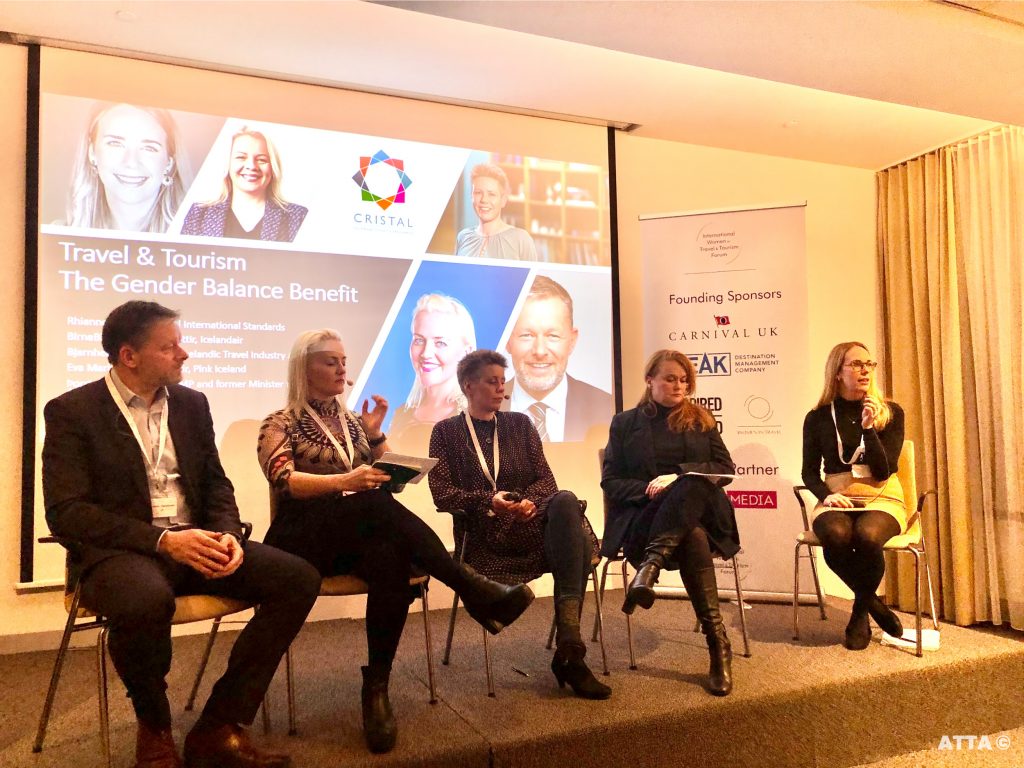Recently I attended the inaugural International Women in Travel & Tourism Forum (IWTTF), held in Reykjavík, Iceland, 22- 24 January. On my way back to Cairo, I had a long transit stop in London’s Heathrow airport, so I arranged to connect with a friend — director of a MENA-based hospitality company who was attending a tourism industry event in London. I was very excited to be part of the IWTTF event and I shared with her some memorable moments. My enthusiasm led us to an interesting discussion on the choice to attend co-ed events or women-only events, especially if the goal is to gain access to new projects and opportunities, and women’s conferences have a reputation for focusing on networking and soft skills. Our discussion ended with an open question: What kind of change and impact could women-only events effect?

It got me thinking. Motivations and rewards differ when women attend conferences designed for a female-only audience, compared with conferences designed for both men and women. These motivations also differ between women, based on their ethnic and cultural background. I also thought of my own motivation to participate in the IWTTF event. I was looking for social connections, exchange experiences and collaboration on projects that focus on diversity and inclusion.
The MENA region – my home – has some of the most important historical and cultural sites in the world, and stunning natural landscapes. It’s an incredible place to visit, and to welcome travelers there is a pleasure. However, reality positioned it behind other regions in terms of economic opportunities, workforce development and women’s agency.
Personally, I have been privileged with multiple successful career opportunities in the MENA region. But it didn’t begin that way. As I was finding my way through the tourism industry, I would definitely have handled some challenges and opportunities differently, if I’d had the chance to network with peers, find mentors, and connect with role models who inspire women in both big and small ways.
There is undeniable power in connecting, and it’s not just about gender. Fighting inequality alone, or striving for success alone, burns a person out and this negative mind set affects other aspects of life. The IWTTF event was an excellent platform for making the kind of connections that can empower and energize anyone, but especially women.
The psychological benefits are crucial. When women become mentors to others and/or share strategies to ask for promotions, seek fair pay, there will be financial outcomes such as equal pay, raises and promotions.
The agenda had a diverse cross-section of speakers including a few male speakers. The keynote address was by the First Lady of Iceland Eliza Reid, and there were five engaging sessions with 25 panelists who exemplified the qualities the forum is attempting to instill. There was a lot of networking, and many topics were discussed, such as the role played by formal and informal education in supporting gender balance, work/life balance, the importance of building a support system, the need for equal access to diverse learning, and creating development opportunities for younger female leaders. Some speakers shared industry insights on how to improve women’s experience of safety and inclusion to better serve their professional interests. It was agreed that as women, we need to actively involve men in diversity and inclusion planning, especially since the male delegates to the forum agreed that sometimes they could feel paralyzed by the gender dialogue.
I was one of the panelists for a discussion titled International Perspectives on Gender and the Culture Equation. My fellow panelists were Dr. Albert Kimbu of the University of Surrey; Ms. Nada Raphael from TourLeb; Ms. Zina Ben Sheikh from PEAK DMC; and our moderator Ms. Jennifer Morris from TTG Media. We discussed how the role of women in different cultures has shaped travel and tourism initiatives in different geographies around the world. We also touched upon how local female and male champions can challenge the status-quo and take actions to influence the development and growth of travel and tourism in their country. Still, the conversation showed that despite these advantages and advancements for women at some destinations, significant inequality persists in other regions, and tourism can be instrumental in bridging this gender gap.
With all these stimulating conversations on my mind, I took a realistic assessment of the present with an optimistic look to the future. The number of conferences organized for female audiences is growing, and it is certain that making connections and building relationships with other attendees and speakers helps women form an understanding of their worth.
Finally, I want to congratulate Ms Alessandra Alonsso, the founder of the IWTTF Forum, on the success of the first event, and I’d like to share her words here: “If we are really to prosper as an industry, diversity and inclusion must be achieved through a collaborative and combined effort. This means also bringing to the table the silent voices; the unsung heroes and those who can share their leadership journeys to inspire others.”
While the adventure travel industry is above average in most cases in regards to the perceptions and roles of women in the workplace, the ATTA feels that it is important to continue to shine light on the subject and reach true equality. We remain dedicated to educating women and men around complex workplace issues; offering women opportunities as leaders and speakers; spotlighting businesses’ energy around diverse leadership; and crafting internal structure and educating our team on diversity. For more on our work around this initiative, please visit https://www.adventuretravel.biz/our-initiatives/
